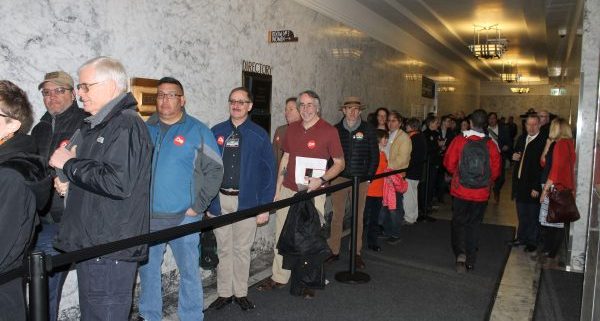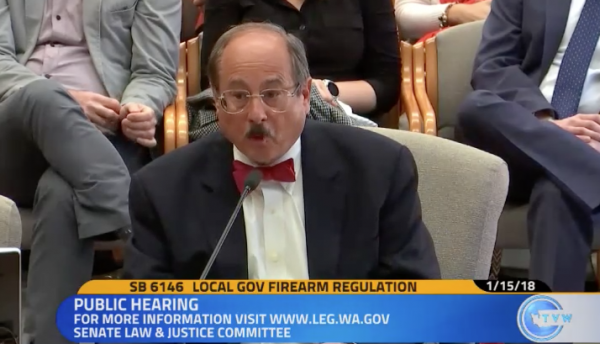
With nearly 1,000 people on both sides of the gun rights issue listening, Second Amendment advocates, including some retired law enforcement professionals, told a Washington State Senate panel that proposed gun control measures in that state will do nothing to prevent crimes, but only penalize law-abiding citizens.
The Senate Law and Justice committee held hearings on six pieces of legislation ranging from a ban on so-called “bump stocks” and original capacity ammunition magazines to one that would undo the state’s 35-year-old preemption statute. The session covered Senate Bills 5444, 5463,5992, 6049 and 6146.
Anti-gunners turned out in force, along with hundreds of firearms owners who returned to the state capitol three days after they had gathered on the steps of that building in opposition to the legislation. The Friday turnout was actually smaller than the number of gun rights activists who appeared on Monday for the hearings.
More than 1,500 emails have been received by the Legislature on the gun issue, according to Sen. Jan Angel, a Port Orchard Repubican, and for Monday’s hearing there were 343 requests to testify. Only a relative handful of those who asked to speak got the opportunity during the two-hour session.
One security officer told Liberty Park Press that for the Monday hearing, people arrived starting at about 6:30 a.m., a full 3 ½ hours before the 10 o’clock hearing actually got underway. There were so many people that two overflow rooms had to be set up, and many people were mistakenly directed first to the Senate chambers, and then back to the Senate legislative building where they stood in the hallways listening to monitors.
Opposing sides either wore stickers demanding “Gun Responsibility Now!” or NRA T-shirts.
While there were emotional remarks from people who had lost loved ones or had survived violent incidents including the Las Vegas mass shooting last Oct. 1, there was also testimony noting that rifles of any kind are used in a fraction of homicides in Washington.
State Sen. Kevin Van de Wege, a Sequim Democrat, sponsored the bump stock bill, telling the committee that the devices “shouldn’t be allowed.” He also said he is a “lifetime member of the NRA,” and considers himself “a pretty strong defender of the Second Amendment.”

But there were some Second Amendment heavy hitters in the audience who also testified. Alan Gottlieb, chairman of the Bellevue-based Citizens Committee for the Right to Keep and Bear Arms, told the committee that the bump stock bill “goes far beyond” those devices.
“These devices do not turn a semi-automatic firearm into a machine gun,” he said. “There’s a lot of misinformation about what they do and accomplish.”
In opposing the proposed magazine ban, he said they are not “large capacity” devices but original capacity magazines that have been used for more than a half-century by Evergreen State residents.
NRA’s Keely Hopkins told the committee that law enforcement reports suggest that so-called “assault weapons” are used in only one to two percent of violent crimes.
“Looking at five years of data,” she said, “there are nine times as many murders with knives, blunt objects, hands and feet than there are with rifles of any type.”
She also cited data from the Washington Sheriff’s and Police Chiefs Association that estimates rifles of any type are used in only three percent of violent crimes, “with semiautomatic rifles being just a small subset of that percentage.”
Hopkins also cautioned that focusing on semiautomatic rifles and standard capacity magazines will “do nothing” to impact crime in Washington state.
Brett Bass, a firearms instructor at the Bellevue Gun Club and a reservist with the Marine Corps, testified that the term “assault weapon” is something of a misnomer. True assault weapons, he said, are machine guns, while in some states even lever-action rifles with tubular magazines are considered “assault rifles.”
Later, Hopkins testified that the preemption law protects firearms rights of citizens across the state.
Likewise, Phil Watson with the Firearms Coalition contended that undoing preemption would create a patchwork of laws that would “ensnare” citizens traveling from one jurisdiction to the other.